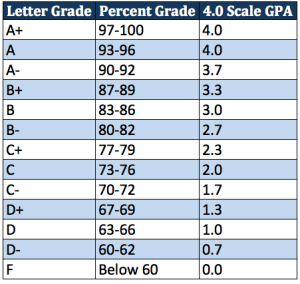Do you go back and forth over scheduling a harder class in risk of getting a lower grade or an easier class in risk of being less impressive to grad schools?
I used to worry about this every semester when planning out my class schedule. I would think, “If only I could get in an admissions officer’s mind and see what their opinion is.” But then, I decided to research myself to find an answer. (My opinions below apply to all but the most extreme scenarios.)
Understanding GPA’s Importance
Your grade point average is a subjective marker of your future success because no individual takes the same classes, with the same teachers, at the same school, to be fairly evaluated. Yet, strength of schedule is even more subjective.
Who knows if Biology 350 is more difficult than Biology 122, or vice versa? Who knows if a degree in Finance is harder than an Accounting degree? Sure, there are stereotypes and unless the major is something outrageous like basket weaving (which is not a major), or the admissions officer happens to know each major at each school by heart (which is impossible), then comparing the difficulty of majors and classes is always up for debate.
I acknowledge that GPAs are not entirely objective, too. But the grad school industry relies more on an applicant’s GPA to predict future success because that is the best marker available (other than test scores, which we will cover).
I’ll concede that a double major in the sciences with a 3.6 GPA is more impressive than an education major with a 3.9 at a community college, but in most cases the difference in majors and school reputation is not that different. So, I believe a person with a 3.9 GPA is much better off than an applicant with a 3.6 GPA in a slightly harder major.
Plus, another advantage of a higher GPA is the leverage gained for scholarships and negotiating scholarships. While a tough schedule can help your admission, there is no scholarships that I know of for having a tough undergrad schedule.
Grades Trump Everything But Test Scores
First, when it comes to grad school admissions, its universal that your test score (GRE, LSAT, GMAT, MCAT score) is the most important factor in your acceptance. So we will label your test score as the king. But after this, grad school admissions officers express the value of applicant’s grade point average as a testament of their future success in the program, and why I label GPA as the queen.
And an applicant’s GPA is totaled in the class’s median GPA for national rankings, where an applicant’s strength of schedule is not measured in the rankings. Simply, a higher median GPA helps the grad school look better and rank higher—which then means more revenue for the program. The school knows this reality and is incentivized to accept people with higher GPAs.
So, yes, your GPA is more important than your strength of schedule (in most cases).
Plan Your Schedule Strategically
Because of GPA’s weight in the application process, it is critical that you keep in mind your chance of success in any given class when scheduling. Don’t outthink yourself by reasoning that grad schools will realize your B or B+ in a harder class is equal to or greater than an A- or A in an easier class.
Although there are multiple elements to getting accepted—like requesting a letter of recommendation—control what you can control, and that is your GPA. Then follow the rest of these 15 grad school application tips to get into your favorite grad school.
Once you get in, check out this guide to see how to fund graduate school.
Now What?
Stay current with updates and sign up for the free Take Your Success newsletter to receive my five productivity tools.
Related post: Does GPA Matter In College? 5 Reasons It’s Secondary



